Components you need for your DIY CNC machine
When embarking on the journey of building your very own DIY CNC machine, prepare yourself for a perplexing array of essential components that demand your attention. Motors, controller boards, power supplies, and frame materials all vie for consideration in this intricate puzzle. Each piece plays an indispensable role in the overall functionality and performance of your magnificent creation.
Let us begin our exploration with the enigmatic motors. These omnipotent forces propel the graceful movements of your CNC machine. As you deliberate over motor selection, ponder upon factors such as torque, speed, and precision. Seek out motors capable of effortlessly accommodating the unique demands posed by your specific projects while ensuring seamless accuracy and fluidity in their motions. And mind you, dear builder, do not overlook compatibility concerns between these mighty motors and the chosen controller board; lest you find yourself grappling with vexatious compatibility issues along this arduous path!
Now we dive headfirst into unravelling the mystique surrounding the pivotal controller board – verily referred to as “the brain” behind your masterpiece contrivance. This astute being assumes responsibility for deciphering design files and issuing commands to those tireless motors that bring life to your visions. In selecting a worthy controller board companion, seeketh thou one harmonious with thy chosen software realm whilst offering features befitting thy needs. Oh! And if like me thou art inclined towards indulging in tinkering with electronics – verily shalt thee derive gratification from connecting and configuring said controller board! But lo! Be prepared for trials aplenty; yet fear not my friend – for such is an integral part of this grand odyssey known as DIY adventure!
Having plumbed the depths concerning motors and controller boards alike – let us now turn our discerning gaze towards none other than ‘the power supply’. Behold its name: it exists solely to furnish thy precious CNC machine with the requisite electrical vitality required for uninterrupted operation par excellence! When faced with the weighty decision of selecting a power supply, do not neglect due consideration to voltage and current requirements exacted by the motors and sundry components. Ponder this: a steadfast power supply is indispensable in thwarting unforeseen disruptions that may plague thy CNC projects.
Lastly, let us engage our rapt attention upon frame materials – those stalwart guardians that hold all things together whilst bestowing stability upon your magnificent invention. Seeketh thou a resilient frame imbued with strength, rigidity, and imperviousness to vexatious vibrations. Amongst the pantheon of favoured materials for CNC machine frames reside aluminium extrusions, steel – perhaps even hardwood! Each material boasts its own unique merits entwined with cons; thus take the time to delve into research as thou contemplateth thine specific needs. Moreover! Cast thy gaze unto crafting said frame – herein lies opportunity aplenty to showcase the finesse of thine artisanal skills. Awaken the creative muse within thee, my dear friend!
Verily I say unto thee: building thine very own DIY CNC machine bequeaths great excitement and rewards alike. By meticulously selecting each component bestowed upon this noble endeavour, rest assured that thy creation shall perform flawlessly while catering faithfully to every bespoke requirement envisioned by thy soulful imaginings. Thusly gird up thy loins! Roll up your sleeves both stout-hearted and resolute! Gather tools fit for this formidable task at hand – for we embark on a grand voyage where creativity triumphs over mundane existence; where dreams are forged into tangible reality before one’s very eyes!
Choosing the right motors for your DIY CNC machine
When it comes to embarking on the adventure of constructing your very own DIY CNC machine, one cannot overlook the paramount importance of meticulously selecting the motors. These omnipotent components are entrusted with orchestrating the movements of various axes within your machine and bestowing upon it the ability to execute precise cuts, intricate carvings, or exquisite engravings upon a plethora of materials. However, amidst an assortment as vast as that which is available in terms of motor options, one might find themselves bewildered by the quandary: how does one discern which motors are most fitting for their unique project?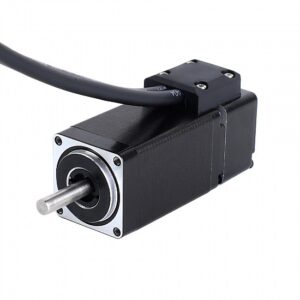
Primarily, before delving into this daunting decision-making process, it behoves you to ascertain the specific requirements that will govern your CNC machine’s functionality. Factors such as its dimensions and proportions demand careful consideration. Furthermore, ponder over what types of materials shall manifest beneath their mechanical prowess and meditate on whether a heightened degree of precision is desired. For instance, if grandiose pieces composed predominantly of wood or metal constitute your artistic visionaries’ delightfully ambitious endeavours; then undoubtedly motors equipped with sufficient torque must be procured to bear these burdensome loads unflinchingly. Conversely, should minuscule intricacies serve as objects worthy enough to grace your creative tapestry; then unquestionably prioritize acquiring motors capable of not only facilitating fluid motion but also endowing you with finer control.
Subsequently, contemplate an array comprising diverse species belonging to the kingdom known colloquially as ‘DIY CNC Machine Motors’. Within this realm reside stepper motors – creatures whose allure stems from their affordability coupled with their innate proclivity towards maintaining unequivocal positional accuracy through performing calculated movements characterized by discrete steps endowed with unparalleled finesse and command over dynamics. Alternatively, consider being seduced by servo motors – beings whose continuous rotation imparts them unwavering allegiance when it comes down to preserving steadfast positioning even under circumstances where disparate loads assert themselves relentlessly upon their unwavering servitude. Although these temptresses might come at a higher price, they consistently deliver elevated performance and thus are often the preferred choice for those engaging in more professional endeavours.
Ultimately, let it be known that the motors you opt to integrate within your DIY CNC machine shall wield an indomitable influence over its overall performance capabilities as well as its fate. Henceforth, embark upon a profound introspection of your unique exigencies; acquaint yourself with the myriad options bestowed upon you by a capricious universe and unabashedly embrace experimentation whilst embracing knowledge derived from triumphs and tribulations encountered along this exhilarating voyage towards self-actualization. For verily, constructing one’s very own CNC machine is an experience brimming with unbounded excitement and unrestrained gratification – where infinite possibilities beckon all daring souls brave enough to plunge into this abyss of creation! Thus, immerse yourself wholeheartedly in this endeavour, relish every step undertaken during this odyssey of innovation, and allow the motors themselves to elevate your artistic ventures unto soaring heights never before fathomed!
Understanding the importance of the controller board in your DIY CNC machine
The enigmatic controller board, akin to the enigmatic brain of your DIY CNC machine, assumes an extraordinary responsibility. It undertakes the interpretation of commands bestowed upon it by your computer and endeavours to translate them into precise movements for the motors. Without this reliable and efficient conductor, your CNC contraption would be nothing but a mere jumble of disjointed parts devoid of any functionality. Consider it as the mastermind behind an orchestra, harmonizing the synchronized motions of various components to produce exquisite outcomes.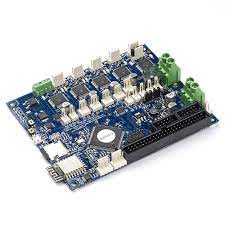
When embarking on the quest for a suitable controller board, one must delve into its compatibility with preferred software – an aspect not to be taken lightly. Varied boards exhibit different levels of synchronization with distinct CNC software programs; hence meticulous research is indispensable to find that perfect match which will seamlessly fuse with your chosen software. This diligent endeavour ensures flawless operation while concurrently diminishing the odds of vexatious compatibility conundrums.
Furthermore, one should also weigh in on the number of axes supported by said board as they must align harmoniously with those required by your CNC apparatus. Whether you opt for a rudimentary or more sophisticated controller board adorned with supplementary features, prioritize fulfilling specific needs whilst ensuring provision for requisite control over your DIY CNC machine.
Selecting the appropriate power supply for your DIY CNC machine
When it pertains to the selection of a suitable power supply for your DIY CNC machine, there exists an array of perplexing and bursty factors that demand careful consideration. Foremost among these considerations is ensuring that the power supply possesses the capability to meet the demanding requirements of your machine. It must possess sufficient power delivery capacity to propel all motors, controllers, and accompanying components without encountering any hindrances. The last thing you desire is acquiring an underpowered power supply that instigates malfunctions or diminishes the performance of your CNC machine.
Additionally, it is imperative to take into account both voltage and current ratings when scrutinizing potential power supplies. Diverse CNC machines exhibit diverse energy demands; thus, selecting a suitable power source necessitates aligning with said demands. Thoroughly examining the voltage and current specifications of your machine’s components will enable you to identify a compatible power supply capable of delivering requisite energy levels. Moreover, it remains vital to select a stable and clean-power yielding unit to ensure seamless operation throughout the lifespan of your CNC machine. Failure to do so may result in imprecise machining outputs while potentially compromising long-term integrity by causing damage at the component level.
In terms of sourcing your desired power supply, several alternatives exist within reach. Certain enthusiasts within the realm of CNC machinery opt for readily available off-the-shelf units specifically engineered for application in this domain. These particular offerings often encompass appropriate voltage-current combinations guaranteeing reliable electrical support for your apparatus as needed. Conversely, one may also explore alternative avenues by considering industrial or electronic-oriented supplies provided they conform adequately with required voltage-current thresholds determined by their respective DIY CNC setups.
To conclude succinctly on this matter: selecting an aptitude-endowed power supply represents a pivotal juncture en route towards optimal performance achievement alongside unwavering dependability concerning one’s self-assembled CNC contraptionry masterpiece creation endeavorment! Therefore, meticulously weighing all facets inclusive of power requisites, voltage-current ratings, and stability characteristics should be regarded as sacrosanct facets when endeavouring to identify the perfect power supply solution. Armed with such knowledge, your journey towards successfully endowing your DIY CNC machine with an efficient source of electrical nourishment shall commence without a hitch!
Finding the ideal frame materials for your DIY CNC machine
When embarking upon the construction of your very own DIY CNC machine, the selection of appropriate frame materials takes centre stage, for it is this foundation that serves as the bedrock of stability and support for all its intricate components. How then, should one navigate the labyrinthine realm of ideal frame materials?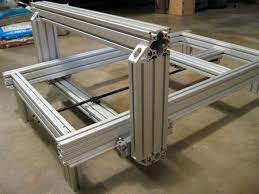
Foremost among these considerations lies durability – an imperative quality in withstanding the relentless vibrations and forces to which your CNC machine shall be subjected during operation. It is thus prudent to gravitate towards resolute metals such as aluminium or steel, renowned for their unwavering strength and rigidity. By embracing such stalwart substances, you fortify your CNC machine against undesirable wobbling or shaking even when confronted with laborious cutting tasks.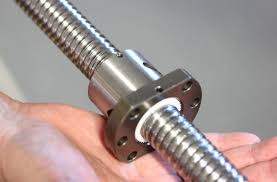
Weight emerges as yet another pivotal factor demanding contemplation. A lighter framework renders manoeuvrability a breeze while simultaneously relieving undue pressure from other components within your contraption. Yet, striking a harmonious equilibrium between weightlessness and steadfastness remains crucial in this delicate dance. Beware! An overindulgence in excessively lightweight materials may compromise overall structural integrity; hence employing ethereal options like acrylic or wood warrants caution primarily restricted to smaller-scale machines rather than behemoth-like configurations boasting formidable power.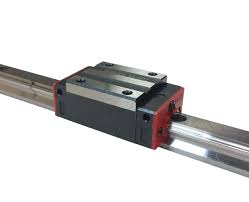
In essence, unearthing the epitome of frame materials tailored specifically for your personal DIY CNC machine necessitates meticulous introspection concerning aspects such as longevity, weight distribution, and dimensions proportionate to said apparatus. Bear in mind that this foundation forms not only the cornerstone but also a testament to your commitment invested into diligent research culminating in selecting superlative materials capable of fostering an indomitable creation – a robust workhorse ready to cater precisely to each individual’s unique CNC requirements
FAQ
What do I need to build a DIY CNC machine?
The perplexing components required comprise frame materials, motors, a controller board, a power supply, and an array of other supporting elements.
How can I select the most suitable motors for my DIY CNC machine?
Delving into the realm of motor selection entails contemplating factors such as torque, speed, and size. Stepper motors are often harnessed in CNC machines due to their ability to execute precise control; alternatively, servo motors proffer elevated power and velocity.
Why does the controller board hold significance in my DIY CNC machine?
Acting at the core of your CNC machine, the controller board transmutes instructions from your computer into motion signals that propel the motors. This pivotal component wields influence over both accuracy and performance.
How might I elect an appropriate power supply for my DIY CNC machine?
To satiate the voracious voltage and current appetites of your motors and ancillary electrical constituents alike, you must procure a power supply capable of meeting these demands. Ponder upon the specific energy requisites entailed within your setup before embarking on this acquisition.
Which frame materials prove ideal for my DIY CNC machine?
The optimal choice concerning frame materials hinges upon variables encompassing budgetary limitations, desired rigidity levels, and personal predilections. Prominent alternatives span aluminium extrusions, sturdy steel, and resilient wood—each material harbouring its own distinctive merits and drawbacks. Thus, opt for what aligns harmoniously with your bespoke necessities.